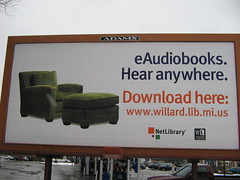by Michael Casey and Laura Savastinuk (from LibraryCrunch)
We know what Library 2.0 is and is not.
Before you can build a house you have to lay the foundation.
What does Library 2.0 mean to you and your organization? What is it that you want Library 2.0 to do for your users? If you don’t know the answer to these questions, you must figure them out before you begin implementing new services and programs.
At Internet Librarian 2007 Liz Lawley said, “You have to figure out what the problem is first before you come up with a solution.” She was referring to the use of Second Life as a method of social interaction with users; however her statement rings true for the general concept of Library 2.0.
Energy focused on implementing new tools and programs is wasted if we don’t know what our users really want. Without knowing that, we create more work for ourselves with hit or miss initiatives.
In the past two years much of the discussion of Library 2.0 has been focused on little things we can do to better serve our users. We try to “get them where they are” by implementing IM reference and creating a presence on social networks such as Flickr, MySpace and Facebook. We attempt to lure them in with gaming nights and rock concerts. These can all be great tools to better serve our users. It is inspiring to see so many libraries creating new ways to reach their users.
However, we have to be careful to not flood ourselves with new projects until we have a clear understanding of what it is we’re trying to do and where we want to go. And in the spirit of
Library 2.0, that means first figuring out what our users want and need.
Maybe it is time we all take a step back and have a mini re-evaluation of Library 2.0, what it is, and how it can help us better serve our users.
Library 2.0 is user-centric. It is a shift in our focus from having libraries decide what is best for users to letting users decide what they want, how they want to get it, and how we can best serve them. Are we doing enough to find out what our users want? It is imperative that we do the research before we throw programs and initiatives at them. Otherwise, we’re the one deciding what our users want and need – a concept that is decidedly not Library 2.0.
Library 2.0 is constant change and evaluation. Once we’ve decided to implement a new service or program, we must continually revisit and evaluate it. Are we asking our users not only if they like it, but also how it can be improved to better serve them? Are we involving staff at all levels in the creation and evaluation process?
Library 2.0 is not just about technology. No matter how much this is said, technology continues to be a leading topic of discussion. We should all be grateful for the doors to our users opened by new technologies. However, we must remember that while technology can be a tool to better serve our users, it is not the final answer to all of our problems.
Library 2.0 is political. Politics tends to be a dirty word, but we absolutely must consider it. Politics, within both our organizations and communities, plays an unavoidable and undeniably important role in our path to better serving our users. We have to get not only our staff and administration on board – we also have to get our library boards, community leaders, and users on board as well. And the best way to do that is to talk to them – let them know that we all share a common goal of providing access to all kinds of information.
We’ve heard from countless librarians who have encountered some form of resistance in their organization to Library 2.0. Why is that? As has been said from the beginning, the spirit and driving force of Library 2.0 is the same tenant that has been a fundamental part of library service for decades – providing our users with access to information. Library 2.0 strives to reach this goal in part through customer-driven services.
Politics will be a part of any organizational structure regardless of what changes come – it’s the dark reality we all must deal with. We can’t avoid it and some would argue that it is healthy. What we can do is strive to maintain focus within our organization and among community leaders on our common goal of providing better library service for our community.
If we focus too much on the details and specific programs before we can explain what it is our users want, then our communities, administrators, library boards, and staff may well rebel against Library 2.0 without ever truly understanding what it is about.
We hope that some conversation can be focused back on the fundamental concepts of Library 2.0, the efforts and resistance for change, and how to figure out what our users really want from us.













